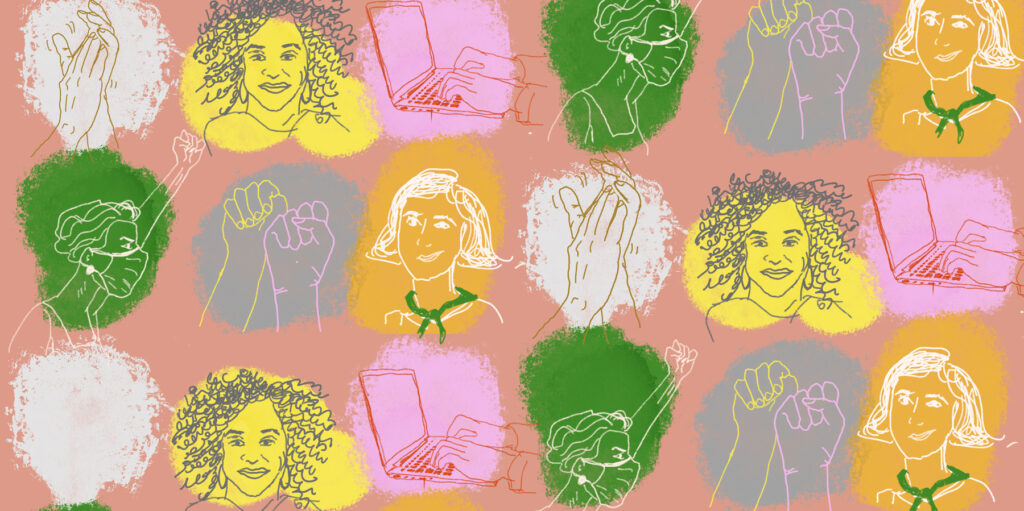Supporters of Tunisian President Kais Saied are using a dangerous tactic to smear women judges in Tunisia: online doxxing. On June 1, President Saied sacked 57 judges in a presidential order, a move widely condemned as an attempt to assert control over all three branches of state power. When a group of judges decided to strike and protest the sacking as an illegitimate “purge,” bloggers began to publish highly sensitive personal information about some of the women judges on Facebook — a defamation campaign meant to shame them into silence.
President Saied has already dismissed the parliament and the government. Now, with Tunisia’s democracy at risk, judges who speak out against the president’s actions are facing exposure and public shaming, while the perpetrators enjoy impunity. These attacks must be stopped, and leaders in government and the social media platforms must reform the laws and policies that make doxxing easy.
Doxxing is not new in Tunisia
Five days after Saied’s decision to sack the judges, a well-known blogger published pictures of a medical report of one of the judges, a woman. The report is a “virginity check” a prosecutor can request when a woman is accused of adultery. It contains very sensitive information about the judge’s private life, which has been used to harm her reputation on the pretext of justifying the sacking.
Another blogger likewise posted information revealing that another woman judge was caught in an apartment with a married man, and has been accused of adultery. Other posts contain private videos allegedly found on the phone of the man she was caught with.
Online doxxing is not new in Tunisia. It has been used in the past to attack, harass, and intimidate women and queer activists. In January 2021, there were reports of similar malicious attacks after youth-led protests against poverty, social discrimination, and police brutality. The perpetrators are benefiting from an atmosphere of impunity and total lack of accountability for both the Tunisian authorities and social media platforms.
What is doxxing and why do social media platforms make it easy?
Doxxing is releasing someone’s personal information online, like phone number, private pictures or home address without their consent and with malicious intent. Most doxxing victims are women who men see as easy targets for online abuse, facilitated by the patriarchy that enables men in robbing women of their privacy and autonomy. Attackers use the same tactics against individuals in other vulnerable communities, like LGBTQ+ people, asylum seekers, and political dissidents.
The rise of social media platforms has made doxxing even more harmful. These platforms count millions of users in Tunisia, creating a perfect playground to disseminate all sorts of information. The platforms’ data harvesting business model plays an important role in the abuse of private data, since doxxing is premised on the idea that “the more you know about your target, the easier it will be to find their flaws.”
Tunisia’s data protection framework: weak and outdated
Online doxxing should be illegal in Tunisia, at least in principle. The campaign targeting women judges is another example of the Tunisian state’s failure to ensure robust safeguards and protection for Tunisians’ personal data. Article 24 of the Constitution stipulates that “the state protects the right to privacy and the inviolability of the home, and the confidentiality of correspondence, communications, and personal information,” and penalizes perpetrators with sanctions under Chapter Seven of the Organic Law 63-2004 On The Protection Of Personal Data.
Despite these sanctions, the law’s scope and enforcement has been generally weak since its enactment in 2004. In 2017,Tunisia ratified the Council of Europe’s Convention for the Protection of Individuals with regard to Automatic Processing of Personal Data (Convention 108) and its additional protocol 181, which requires the Tunisian authorities to amend its outdated data protection law. The ongoing doxxing attacks against women, activists, and judges underscore the urgent need for legal reform, as well as for stricter and stronger measures to protect people’s personal data online.
What should platforms and Tunisian authorities do?
Social media companies have an important role in doxxing. Facebook makes sharing and spreading of posts satisfying and rewarding. At the same time, it does not have a specific doxxing policy and victims are unable to seek remedy easily and clearly.
Facebook should adopt and implement a consistent general policy on doxxing, taking into account that even publicly available information can be very harmful. Reporting doxxing should be made easy for victims through a clear process, and the company should establish an appropriate timeline to respond to complaints. This policy must also address the issue of accounts and profiles known to be repeat abusers.
The data harvesting business model of platforms like Facebook opens our data to all kinds of abuse, including doxxing. Facebook should implement data minimization practices and better inform people about the risks of sharing personal information on their profiles. The platform should also set the sharing settings to the highest privacy standards, by design and by default.
Tunisian authorities have the obligation to ensure the safety of the targeted women judges, online and off. They are also obligated to implement the right to personal data protection as required by Article 24 of the Tunisian Constitution and the Organic Law 63-2004 on The Protection Of Personal Data. This means conducting a transparent and independent investigation to identify the perpetrators to hold them accountable for their actions, and strengthening Tunisia’s data protection laws.
The burden of defense against doxxing should not be on the victims. Platforms and authorities must stand to protect our privacy and ensure remedy by adopting proactive measures. The digital space should be a safe place for all of us, especially the most vulnerable.
